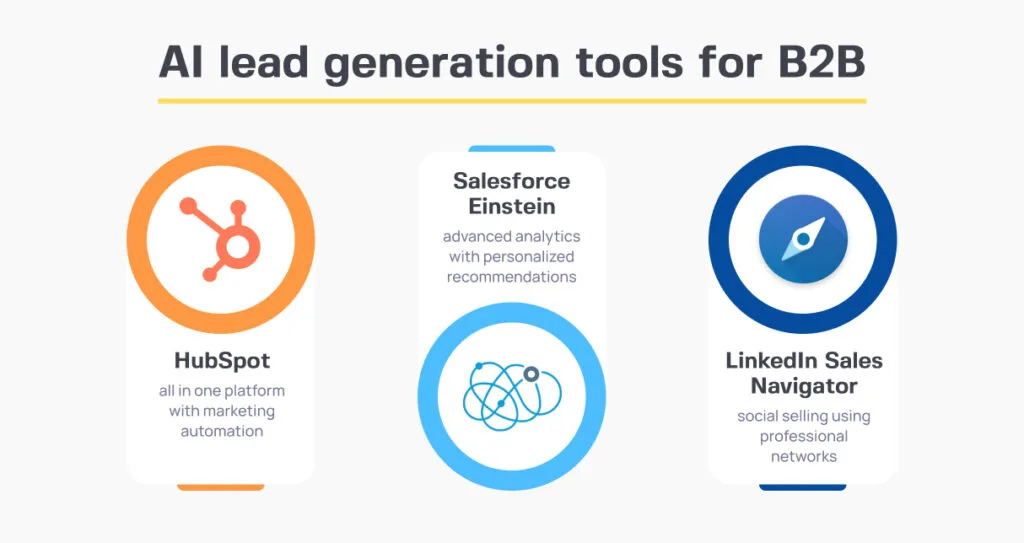AI Automation for B2B: Methods to Improve Your Organization Performance
AI automation in the B2B sector offers a pivotal opportunity for companies to improve their performance. By improving and streamlining procedures decision-making, companies can achieve substantial efficiencies. The effective combination of AI calls for cautious factor to consider of various factors. Understanding which areas to automate and choosing appropriate tools are just the beginning. The possibility for transformation raises essential inquiries about application and continuous examination. What techniques will ensure long lasting success in this developing landscape?
Recognizing AI Automation in B2B Context
As companies significantly seek effectiveness and development, comprehending AI automation in the B2B context becomes vital. AI automation leverages advanced modern technologies to enhance processes, improve decision-making, and improve general productivity. By integrating AI tools, companies can maximize operations such as supply chain monitoring, client partnership management, and data analysis. These innovations can evaluate substantial quantities of data swiftly, offering workable insights that drive critical campaigns. Furthermore, AI-driven automation lowers human error and liberates staff members to concentrate on more facility jobs. By fostering partnership in between human knowledge and equipment capabilities, services can attain a competitive side. Eventually, recognizing AI automation is essential for B2B companies aiming to grow in a significantly electronic marketplace.
Identifying Areas for Automation
In the quest for reliable AI automation in B2B, it is vital to identify specific locations where automation can yield significant benefits. This consists of examining task repetitiveness, exploring opportunities for data handling, and pinpointing workflow traffic jams. By concentrating on these elements, organizations can simplify procedures and enhance productivity.
Task Repetitiveness Evaluation
Task repetitiveness evaluation plays an important function in identifying areas ripe for automation within B2B procedures. This procedure includes examining daily tasks to figure out which are repeated and time-consuming, consequently impeding productivity. By inspecting operations, businesses can identify details functions that call for too much hand-operated input, such as data entrance, billing processing, or consumer follow-ups. Acknowledging these recurring jobs allows organizations to assign sources better, enhancing total effectiveness (AI Automation For B2B). Additionally, automation can reduce human mistake, simplify procedures, and maximize workers to focus on higher-value tasks. Carrying out a complete task monotone evaluation encourages B2B organizations to take on targeted automation approaches, inevitably driving boosted efficiency and affordable advantage in the marketplace
Data Handling Opportunities
Various information handling possibilities exist within B2B organizations, offering substantial potential for automation. These opportunities often develop in locations such as data access, invoice handling, and consumer partnership monitoring. By automating information collection and validation procedures, companies can decrease human mistake and boost effectiveness. Furthermore, automating record generation enables teams to access real-time insights, promoting timely decision-making. Supply monitoring systems can additionally gain from automation, improving supply tracking and order handling. Leveraging AI in information analytics allows companies to reveal fads and patterns that may or else go undetected. Inevitably, embracing automation in these locations not just optimizes procedures however also maximizes useful resources, allowing staff members to concentrate on calculated initiatives that drive development.
Process Traffic Jam Identification
Recognizing process traffic jams is a critical action in realizing the complete benefits of automation within B2B companies. These bottlenecks usually materialize as hold-ups, resource restraints, or inefficient procedures that hinder performance. To efficiently determine these areas, organizations can conduct thorough analyses of their operations, utilizing metrics such as cycle time and throughput. Involving employees in conversations about pain factors can also offer important understandings. Once traffic jams are recognized, companies can prioritize them based on effect and feasibility for automation. By purposefully dealing with these inefficiencies, B2B business can enhance procedures, enhance collaboration, and eventually boost total efficiency. This proactive method to operations analysis lays the foundation for successful automation initiatives that drive service growth.
Picking the Right AI Tools and Technologies
As companies significantly transform to AI to boost their procedures, picking the right devices and technologies becomes vital for accomplishing wanted end results. Organizations has to review their details demands and purposes, taking into consideration factors such as user-friendliness, compatibility, and scalability. An extensive market analysis can assist recognize leading AI solutions customized for their industry. Additionally, companies must evaluate the technical framework called for to support these tools, ensuring smooth integration with existing systems. Information protection and compliance with regulations are additionally critical factors to consider that influence tool option. By concentrating on these criteria, business can make informed choices that drive effectiveness and productivity, inevitably causing improved organization efficiency. The right AI devices empower companies to innovate and keep a competitive side out there.
Creating a Critical Implementation Plan
A successful critical application strategy for AI automation in B2B requires plainly defined crucial objectives. B2B Automation Consulting. Additionally, organizations need to analyze their existing abilities to determine gaps and opportunities for improvement. Continual tracking and modification of the strategy will certainly assure positioning with developing company needs and modern technology innovations
Specify Key Purposes
To ensure effective AI automation in B2B atmospheres, specifying crucial objectives is necessary for developing a critical implementation strategy. Organizations must recognize particular, quantifiable goals that line up with their total service strategy. This clearness gives a roadmap for the automation process, making certain that efforts are concentrated on locations that will yield the highest effect. Key goals might consist of enhancing functional effectiveness, boosting client satisfaction, or enhancing income. Establishing these goals allows groups to prioritize resources efficiently and track progression over time. Furthermore, clear goals promote better communication among stakeholders, promoting cooperation and placement throughout the organization. Ultimately, well-defined goals offer as the structure for a durable AI automation approach that drives company performance.
Examine Existing Capacities

Screen and Readjust
Carrying out AI automation requires a vibrant technique that emphasizes continual tracking and change - Minarik AI. Organizations need to create a critical execution strategy that integrates routine examinations of AI efficiency against predefined metrics. This entails monitoring vital efficiency indications (KPIs) to examine the performance of automation options. By examining information, organizations can determine areas for renovation and adjust their AI systems appropriately. Engaging with stakeholders throughout the process assures that the automation straightens with service goals and user needs. In addition, promoting a culture of adaptability permits business to respond quickly to changing market conditions and technical improvements. Ultimately, recurring surveillance and modification not only enhance operational efficiency yet likewise drive sustained organization performance in the affordable B2B landscape
Ensuring Data Quality and Combination
As organizations significantly depend on AI automation in B2B procedures, guaranteeing data high quality and integration comes to be essential for success. Premium data is necessary for precise analytics, educated decision-making, and effective client involvement. Data have to be cleaned, standard, and validated to get rid of mistakes and inconsistencies that might lead to misdirected understandings. Additionally, smooth assimilation across different systems and systems is crucial; disparate information silos prevent automation efforts and lower operational effectiveness. Organizations needs to adopt durable information governance frameworks and use innovative tools to help with information assimilation while maintaining quality criteria. By prioritizing these aspects, organizations can enhance their AI automation initiatives, eventually causing boosted efficiency and an affordable benefit in the B2B landscape.
Gauging Success and ROI of AI Initiatives
Just how can companies properly measure the success and roi (ROI) of their AI initiatives? To gauge effectiveness, businesses must establish clear, quantifiable objectives straightened with calculated purposes. Secret efficiency indications (KPIs) such as cost financial savings, earnings development, and efficiency enhancements can give valuable understandings. Organizations usually perform standard analyses prior to carrying out AI, allowing them to compare pre- and post-implementation metrics. Additionally, evaluating customer complete satisfaction and interaction can reveal the impact of AI on customer experience. Routinely reviewing these metrics aids in refining AI approaches and making certain positioning with service goals. By employing an organized technique to measurement and evaluation, companies can precisely evaluate the effectiveness of their AI campaigns and make educated decisions concerning future financial investments.
Conquering Challenges in AI Fostering

Frequently Asked Concerns
Just How Can AI Automation Improve Consumer Relationship Management in B2B?
AI automation can improve client connection monitoring in B2B by streamlining communication, offering personalized interactions, evaluating customer data for understandings, automating follow-ups, and boosting feedback times, ultimately promoting more powerful connections and driving sales development.
What Industries Benefit A Lot Of From AI Automation in B2B?
Production, financing, health care, and logistics markets benefit most from AI automation in B2B. These industries take advantage of automation to improve processes, enhance data evaluation, improve client interactions, and ultimately increase operational performance and productivity.
Just How Does AI Automation Influence Worker Duty in B2B Companies?
AI automation transforms staff member duties in B2B business by improving tasks, reducing recurring job, and enabling staff to concentrate on calculated efforts. This shift boosts productivity and fosters a society of advancement and adaptability.
What Are the Prices Connected With Implementing AI Automation?
The costs linked with executing AI automation consist of preliminary software procurement, facilities upgrades, training expenses, continuous upkeep, and potential assimilation difficulties. Business Process Automation. Firms have to additionally consider long-term functional changes and worker adjustment expenses in their financial planning
How Can Companies Make Sure Honest AI Use in Their Operations?
Businesses can guarantee moral AI usage by establishing clear guidelines, advertising openness, carrying out regular audits, involving varied stakeholders, and focusing on data privacy. Continual training and recognition programs additionally improve understanding and adherence to ethical techniques.
As services progressively seek effectiveness and development, understanding AI automation in the B2B context comes to be crucial. In the mission for efficient AI automation in B2B, it is crucial to determine particular locations where automation can generate substantial benefits. An effective calculated implementation strategy for AI automation in B2B needs plainly defined key purposes. To guarantee effective AI automation in B2B atmospheres, specifying essential purposes is necessary for developing a critical application strategy. As organizations significantly depend on AI automation in B2B procedures, guaranteeing information quality and assimilation becomes crucial for success.